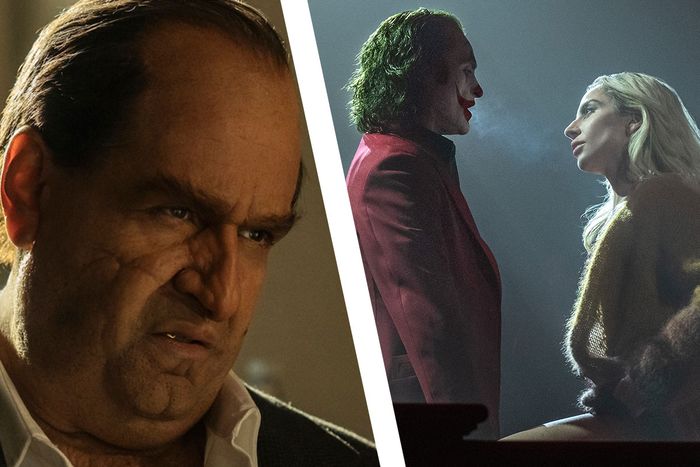
Comparing a TV show to a movie might feel like comparing a flightless bird to a clown, but alas, they’re from the same tree—a tree where a bat with a really deep voice hangs. The Penguin is HBO’s newest show from the world of Batman/DC Comics, and it will premiere next week. The series takes place after the events of Matt Reeves’s The Batman from 2022, the one where Rob Patz is all hot in it, and follows Coin Farrell as Oswald “Oz” Cobb aka the Penguin. It arrives just a few short weeks before Joker: Folie á Deux premieres in theaters, the one where Joaquin Phoenix and Lady Gaga sing (while being all… scary.) While both projects are different entertainment mediums (a movie and a TV show), they have one very important thing in common besides their origins: neither project features Mr. Bat in it — and both are arriving on screens within a month of each other. Gotham City is really in the spotlight. But how do The Penguin and Joker: Folie á Deux compare against each other, at least in the eyes of the critics? Are they both giving people Joker smiles or is one stealing the show?
A Rookery Assembles for The Penguin
“What series creator Lauren LeFranc achieves is a contradiction. By excising Batman and his fantastical sway on Gotham from The Penguin, the city’s criminal underworld feels more grounded in the quotidian details of drug deals and power plays, in actual matters of life and death. Frank Sinatra’s “Call Me Irresponsible” plays on the soundtrack, someone references Ginger Rogers’s tap-dancing prowess, and Rita Hayworth’s Gilda reruns on an old box-set TV, and there’s no interruption in our suspension of disbelief. But somehow, within that earthly milieu, The Penguin also slots in Milioti and Farrell doing big-A Acting — chewing up scenery and snarling over dialogue like they’re low-key auditioning for a Martin Scorsese movie. The tension in the series’ contradictory flavors of minimalism and maximalism allows The Penguin to slide right along, gathering speed as it moves toward a final act that reflects LeFranc’s deep understanding of her titular character and her extreme confidence in refusing audiences the hell-yeah ending they might think they want.” — Roxana Hadadi, Vulture
“Despite losing so much in the Riddler’s attack, Vic is gentle-hearted and fearful, and has a stutter. Yet Oz senses something in his new protégé that once brewed inside him — a desire to fit in somewhere. Oz uses Vic’s vulnerability to build a bond with him. Across eight episodes, their father-son relationship showcases glimmers of who Oz could have been if Gotham and his mother, Francis (a fantastic performance by Tony winner Deirdre O’Connell), hadn’t hardened him long before he reached manhood. Feliz brings such tenderness to Vic that in spite of the heinous activities he participates in, the viewer can readily forget how diabolical Oz’s plans are.” — Aramide Tinubu, Variety
“The Penguin is a spinoff from Matt Reeves’ The Batman, an already ground-level approach to DC Comics lore that introduced us to Farrell, wholly unrecognizable beneath layers of prosthetics, as a nightclub owner and second-tier gangster. Here’s the thing: You offer me the Penguin as a stunted, fish-swallowing freak with an ill-fitting tuxedo and skin so pale he’s practically translucent, and I’ll happily request, “Tell me more.” Offer me a Penguin who’s a husky, underappreciated mobster with insecurity fueled by an unhealthy attachment to a mother who coddles him with one hand and emasculates him with another, and my first reaction will be, ‘Yes, I’ve seen The Sopranos before.’” — Daniel Fienberg, The Hollywood Reporter
“The secret to that riveting quality is the series’ willingness – no, eagerness – to go beyond the comics to locate something new in an 83-year-old character originally created for children. In the very first scene of the first episode, we get a bracingly clear sense of who this Oswald Cobb is, as he reminisces with Zegen’s Alberto Falcone about a made guy from Oz’s old neighborhood who commanded respect. Farrell is perfectly calibrated, here, and lets us see how hungrily Oz pines to be loved and admired – and how quickly and lethally he reacts when that love and admiration is denied him.” — Glen Weldon, NPR
“But the near-total absence of other notable Bat-characters (save a D-list baddie who appears in one episode), or even for the most part people from The Batman, makes The Penguin feel like a brand extension without much interest in the brand. It’s a watered-down Boardwalk Empire type drama whose central figure happens to have a few traits in common with a famous character. At least when Reeves wanted to unofficially remake Se7en, he was willing to put Robert Pattinson into the Batsuit, driving the Batmobile, in order to do it.” —Alan Sepinwall, Rolling Stone
Joker: Folie á Deux Is a Mixed Bag
“Joker: Folie à Deux is Arthur’s movie, and Arthur just isn’t that interesting, despite how much effort Phoenix puts into rendering the character in exquisitely anguished mental and sunken-chested physical detail. In the film, Arthur is a void onto which others project what they want to see. He has a split personality, according to his devoted lawyer, Maryanne Stewart (Catherine Keener). He’s someone faking a mental illness, according to DA Harvey Dent (Harry Lawtey). He’s a charismatic troll who tells the world to go fuck itself, according to his fans, among them Lee, who says that when she watched him murder Murray Franklin, “for once in my life I didn’t feel so alone anymore.” Phillips can’t seem to pinpoint what Arthur is either.” — Alison Willmore, Vulture
“Joker: Folie à Deux may be ambitious and superficially outrageous, but at heart it’s an overly cautious sequel. Phillips has made a movie in which Arthur really is just poor Arthur; he does nothing wrong and isn’t going to threaten anyone’s moral sensibilities. In fact, he actually blows the only good thing that ever happened to him — winning the love of Lee’s Harley Quinn — because he denies the Joker in himself. He’s now just a singing-and-dancing puppet clown living in his imagination. Is that entertainment? Audiences, I suspect, will still turn out in droves to see “Folie à Deux.” But when it comes to bold mainstream filmmaking, it’s the scolds who are having the last laugh.” —Owen Gleiberman, Variety
“But for a movie running two-and-a-quarter hours, Folie à Deux feels narratively a little thin and at times dull. Phillips and co-writer Scott Silver in the first Joker had the sturdy bones of not one but two Martin Scorsese films, Taxi Driver and The King of Comedy, on which to hang their story and set their tone. This one is built on more of a conceit than a solid story foundation. It kicks up associations with everything from golden age movie musicals to auteur experiments like One From the Heart, without nailing down a workable model to provide much shape or structure.” — David Rooney, The Hollywood Reporter
“It’s a disappointing film – but I suspect that’s exactly what it’s meant to be. What Phillips appears to be doing is responding to the way Fleck was received by fans of 2019’s Joker. To me, he always came across as a passive unfortunate who stirred up riots more or less by accident, but some viewers saw him as a revolutionary Robin Hood, striking a blow for the dispossessed. In Joker: Folie à Deux, Phillips isn’t taking any chances. He has devoted his sequel to the message that Fleck is a wimpy, self-centred stooge who lets down everyone around him. He’s a nobody. Depending on how you look at it, this demythologising exercise is either daring or it’s irritatingly smug, but it’s definitely not much fun. Phillips seems to be saying that if you fell for Fleck’s Messianic self-image the last time around, then the joke’s on you.” — Nicholas Barber, BBC
“It ultimately escalates to a courtroom drama of farcical Foghorn Leghorn proportions, and while the final act does not quite build the same tension and drama as the first film’s remarkable doomed talk-show climax, it does manage to draw a neat bow on this particular story. In a cinematic climate saturated by superheroes, supervillains, and even Jokers (there were at one point three actors simultaneously in the role), Phillips, Phoenix and now Gaga have fashioned a genuinely original narrative, even in its obvious magpie’s-nest borrowing. Folie À Deux is not the definitive Joker story — maybe there will never be one — but no other adaptation has burrowed this far under the character’s face-painted, mutilated skin.” —John Nugent, Empire


